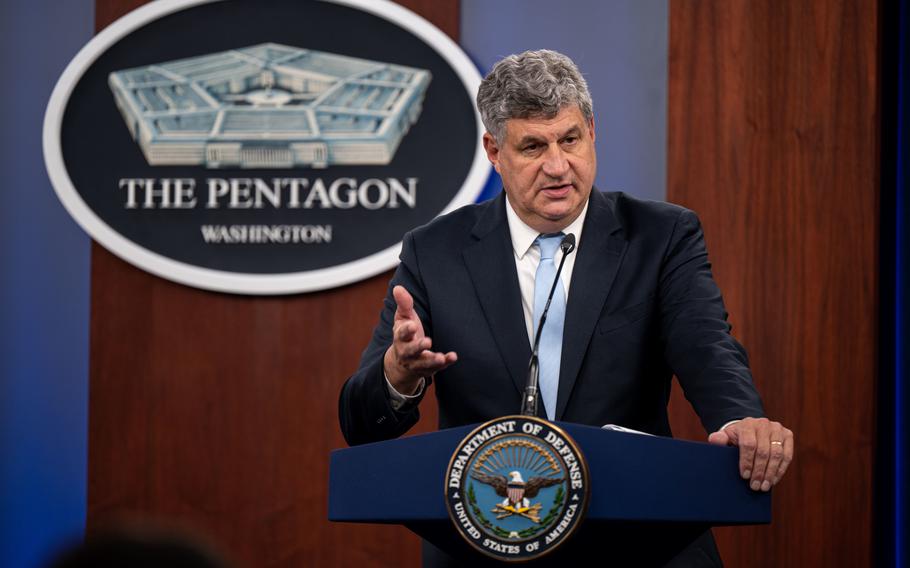
Undersecretary of Defense for Acquisition and Sustainment Bill LaPlante holds a news briefing in September 2022 at the Pentagon. (Alexander Kubitza/DOD)
WASHINGTON — A government shutdown would harm U.S. defenses, hurt troops and be welcomed by Russia and China, a top Pentagon official said Tuesday.
“It’s just horrible. There’s really nothing good you can say about it,” said William LaPlante, the Pentagon’s undersecretary of defense for acquisitions and sustainment.
LaPlante, who is a leader in matters such as military contracts, materiel readiness, the acquisition workforce and the defense industrial base, made his remarks during a discussion with the Center for Strategic and International Studies, a Washington think tank that focuses on national security.
The federal government will shut down Sunday unless Congress passes funding for fiscal 2024 or at least agrees to a continuing resolution, which is a stopgap measure that keeps things operating for a short time at existing funding levels. But a small group of hard-line Republicans in the House are stalling the budget process over a variety of issues such as aid to Ukraine and former President Donald Trump’s legal troubles.
If Congress doesn’t agree to a funding plan and there is a shutdown, it would affect all government agencies including the U.S. military. All active-duty troops and “essential” civilian defense workers would have to keep working, but they wouldn’t be paid until the shutdown is resolved.
LaPlante, who has been in his Pentagon post for about 18 months, said a shutdown would affect the military in much deeper — and perhaps unexpected — ways.
“I have some testing we want to do next week on an item for Ukraine and unless we can get some type of a waiver, it’s not going to happen. And people are not going to be able to travel, so it’s extremely disruptive,” he said. “The message it sends to the government workforce, you know, we’re sending people home who are engineers, are acquisition professionals, are sustainers, are contracting officers — we’re just sending them home and saying, ‘You are not essential.’ ”
Last week, Defense Secretary Lloyd Austin exempted Ukraine-related operations from being affected by a shutdown, meaning essential activities related to helping Ukrainians defend their country against Russia will be protected. That includes sending weapons shipments to Ukraine. However, Pentagon officials, including LaPlante, have said U.S. assistance to the Eastern European nation will almost certainly be affected in peripheral ways.
The Defense Department said Monday, for example, that some civilian workers who are involved with Ukraine — but are not considered essential — would be furloughed. The Pentagon said that would trickle down eventually to affect Ukrainian operations.
In its National Defense Strategy last year, the Defense Department identified Russia as an ongoing concern, but it named China as the No. 1 “pacing challenge” for the U.S. in the world — particularly with Beijing expanding its reach and influence and its constant eye on unifying with Taiwan, which it considers a breakaway territory. To support the strategy, the Pentagon has put a priority on policies and operations intended to keep China in check, but most of those items would likely also become casualties of a government shutdown.
“Can you imagine if the Chinese did something like this? Where their government would shut down every few years, and they would freeze their budget, not start up things for six months,” LaPlante asked. “[The United States] would not view that badly.”
Anything less than full funding for 2024, the Pentagon has said, would have a negative impact on national security and U.S. defenses around the world. That’s because a continuing resolution, or CR, would keep the department from funding anything beyond the short term. LaPlante said the difference between a shutdown and a CR is like choosing between “real bad” and “so bad.”
“Any increases in production aren’t going to happen [with a CR],” he said, citing the effects of past shutdowns. “In the past, this affected [guided multiple launch rocket systems], it actually affected Patriot [air-defense systems]. That’s a CR.”
LaPlante added: “Testing will stop. … In 2013 [during a shutdown] … production lines stopped, F-35s stopped, munitions stopped.”
The House was expected to vote Tuesday on a package of bills to fund parts of the government, but it’s unclear if there will be enough votes to pass them, according to The Associated Press. The news outlet also reported the Senate is preemptively working on a bipartisan stopgap funding plan to avoid a shutdown.
Hundreds of thousands of active-duty troops in the U.S. and more than 170,000 abroad would not be paid during a shutdown, according to the Pentagon.
“Extreme House Republicans are playing partisan games with peoples’ lives and marching our country toward a government shutdown that would have damaging impacts across the country — including undermining our national security and forcing service members across the country and around the world to work without pay,” the White House said in a statement Tuesday. “House Republicans have turned their backs on the bipartisan budget deal that two-thirds of them voted for just a few months ago and have instead proposed devastating cuts to programs that millions of hardworking Americans count on.”